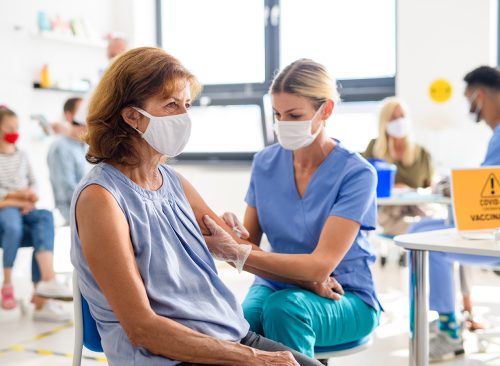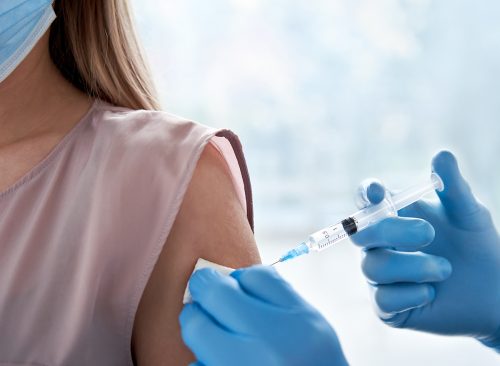Doctors Are Concerned as COVID-19 Deaths Increase
Experts express concern over recently released data.

Every fall, COVID-19 infections seem to follow a trend: Cases spike and continue doing so through winter. This year is no exception, with two new highly infectious variants circulating. This week Advisory Board, a group that delivers the top stories to healthcare professionals across the country, expressed concern with a few majorly troubling statistics surrounding COVID-19, reporting a spike in fatalities.

According to recent data released by the CDC, COVID-19 hospitalizations dropped roughly 3% for the week ending in Sept. 23 nationwide, which is good news. However, the same data found that COVID-19 deaths rose 8%.

A new survey from the National Foundation for Infectious Diseases (NFID) also found that adults are more likely to get vaccinated against the flu than COVID-19 this winter – and only a fraction are planning on getting the new vaccine.

According to data released by the CDC, there were 19,079 new COVID-19 hospitalizations for the week ending in Sept. 23. This is a 3.1% decrease from the week before. .

There was also a decrease in ED visits for COVID-19, down 11.7% compared to the previous week.

However in that same week 2.7% of all deaths in the United States were due to COVID-19, an overall 8% increase in COVID-19 related deaths over the previous week.

Additionally, 12 states saw substantial increase in hospitalizations. Eight states saw a moderate increase during the same week.

A recent survey from NFID found that only 40% of Americans are planning on getting the new COVID-19 vaccine, 43% of Americans said they’re either unsure or not planning on getting vaccinated against the flu, and just 40% of adults ages 60 and older said they intend on getting vaccinated against respiratory syncytial virus (RSV). Why? They said they are concerned about side effects, mistrust of vaccines, and don’t believe that the vaccines work well.

Patricia Stinchfield, president of NFID, calls the survey data “concerning” and issues a warning. “These diseases can be serious, even in healthy children and adults, but the good news is that we now have prevention tools available to help protect people against severe illness and complications,” Stinchfield said. “We just need to use them.

“As healthcare professionals, we need to address these unfounded concerns and create realistic expectations about what vaccines can and cannot do,” Stinchfield said. “Even in cases when vaccination does not prevent infection entirely, getting vaccinated can help protect against serious complications, including hospitalization and death.”
RELATED: Surprising Signs You’ve Already Had COVID

CDC Director Mandy Cohen urged Americans to get vaccinated against COVID-19, the flu, and RSV at a recent press conference. “For the first time, we have immunizations available to help protect against the three major respiratory viruses — COVID-19, flu, and RSV,” Cohen said. “I strongly encourage you and your family to get the immunizations that are right for you. We must use all available tools to protect those most at risk, including infants and young children, pregnant people, older adults, and those with chronic health conditions.”














